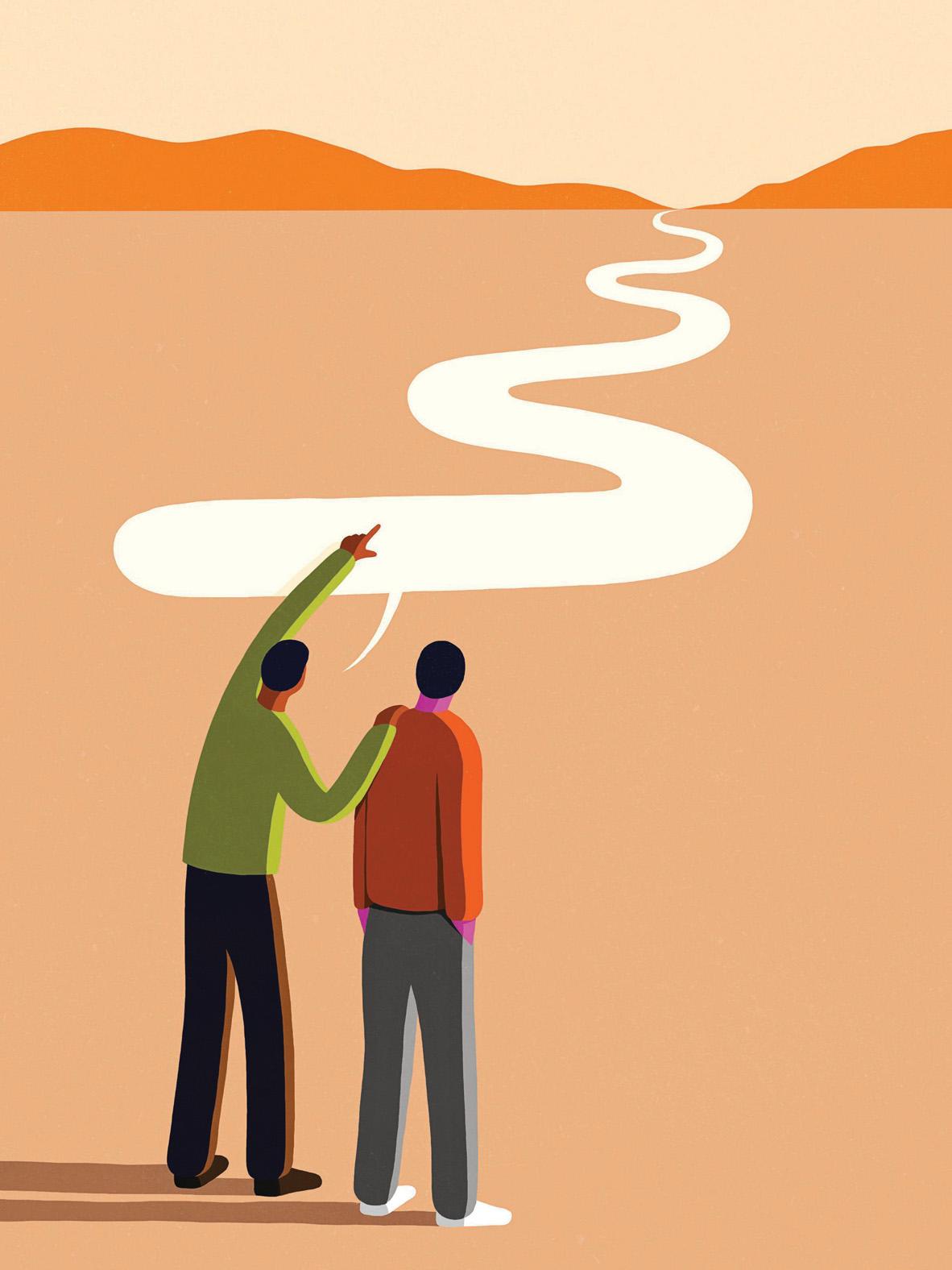The idea is to provide "a new type of support that you don't get from going to a generic support group, perusing Reddit or Facebook groups, or meeting with a therapist," says CEO Alyssa Pollack, a former executive at Uber Eats. The person on the other side of your screen isn't a mental-health professional, but can speak to "the specific 'lived experience' that you're going through." Though the app is new, the idea is not. Fello and other platforms like it are selling something that humans have long gotten for free: peer support. "It's something that people naturally do," says Kelly Davis, vice president of peer and youth advocacy at the nonprofit Mental Health America. "If you're having a hard time, you often seek out someone else who went through something similar."
Increasingly, that human tendency is being packaged and pitched as an answer to a deepening problem: traditional mental-health care is hard to find and hard to afford. Demand far outpaces supply, and providers often charge hundreds of dollars per session. The result is that more than half of U.S. adults with a mental illness did not receive treatment for their conditions as of 2022, according to Mental Health America. Overall, 42% of Americans say they're concerned about their mental health, Harris Poll data finds, but only 10% of U.S. adults are seeing a therapist.
Peer support isn't a complete fix. Lived experience can't replace the years of training that mental-health professionals receive, especially for particularly sensitive situations or vulnerable groups. But some advocates, including policymakers within the Biden Administration, argue it helps meet needs. Peers may offer a more attainable and softer-touch form of support for people who don't want or require clinical treatment-or a complementary approach for people who are in treatment but feel something is missing. A peer offers something unique: the kind of camaraderie and practical advice borne from going through something hard and making it to the other side.
Keith Humphreys, a professor of psychiatry and behavioral sciences at Stanford University, says this kind of care can be invaluable for patients and the system at large. Some people going through a tough time-a career setback, relationship hurdle, or life transition-just need a sympathetic ear. If they can get that from a peer rather than a specialist, they could free up mental-health services for people who truly need them, and perhaps get a type of guidance better suited to their situation.
image [https://cdn.magzter.com/1452683603/1732801082/articles/Xl6oGQ0jr1732883075605/3837255721.jpg]
These days, people who want peer support have lots of options. Alcoholics Anonymous (AA) has been using community to help people get and stay sober for nearly a century, and has inspired spinoff groups like Narcotics Anonymous and Workaholics Anonymous. Peer-counseling centers are becoming popular at schools and colleges. The National Alliance on Mental Illness runs a free peer-to-peer mentorship program for people with mental-health conditions. Federal and state health officials have even drafted rigorous training and competency requirements for people who wish to become professional peer supporters. In most states, if individuals meet these standards-which usually involve at least 40 hours of training, sometimes augmented by additional supervision by mental-health professionals-they can bill their services to Medicaid.
Fello isn't the first app to wade into these waters. (It's not even the first founded by an ex-Uber employee-that would be Basis, which launched in 2018.) Platforms including HeyPeers, HearMe, TalkLife, and 7 Cups offer similar services. But virtual peer support isn't always executed well. Some companies have dealt with safety issues, like bad actors who abuse the model to give harmful advice or prey on vulnerable people.
Fello is betting that because loneliness is at epidemic levels and people are clamoring for novel forms of mental-health support, it's time for something new. "There's been a major shift, even in the last five years, for people's propensity to go get support," Pollack says. Why not get it from a stranger on your phone? The app, which launched in August, already has thousands of users and hundreds of peer supporters, called "Fellos," Pollack says. People seeking help with substance use, parenting, or relationships are matched with people with no special qualifications other than having lived through something similar. To become a Fello, all someone has to do is clear a background check, submit references who can vouch that they've experienced what they claim to, complete roughly five hours of training significantly less than would be required of state-certified peer supporters-and pass an assessment. The app charges $40 per 30-minute session, and the Fello pockets 70% of the fee.
Not all experts are buying it. Dr. John Torous, director of digital psychiatry at Beth Israel Deaconess Medical Center in Boston, says he has reservations about paying to chat with strangers who may be seen as alternatives to therapists, but who don't have the training or licensure to back up that perception. "Who are these people, really?" he says. "That's the part that's concerning."
Apps like Fello operate in a gray area: their peer supporters aren't professionals, but they're not quite friends either. That makes Torous uneasy. "We don't want to make having a conversation costly," Torous says. "That would be a bad trend for society, if you have to pay to talk."
AT THE CORE of this debate is a straightforward question: can hearing about someone else's life improve your own?
The science on peer support is mixed. For starters, it might not be great for the person dispensing the advice. Although some peer supporters report gaining resilience and insight into their own conditions, it can be emotionally taxing to relive challenging experiences over and over again.
Many peer supporters do just fine psychologically, or even grow and find community, but the practice introduces the risk of burnout and emotional exhaustion, studies suggest.
Among people receiving peer support, there's minimal evidence to suggest the practice leads to "clinical recovery"-the sort of symptom reduction a traditional medical provider would measure. A 2019 research review concluded that t...


